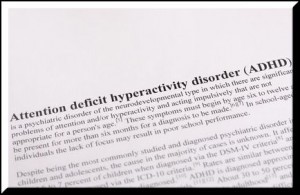Part 1 of a 4-Part Series
 This is the first article in a series on Adult ADHD in which I discuss common questions and answers regarding the condition. Over recent years, there has been increased awareness and understanding of ADHD as a developmental condition in children, with better diagnostics and individualized options for intervention and treatment. Many adults with ADHD become aware that they may need an evaluation when their own son or daughter is diagnosed with ADHD, and they become aware that they also experience some of the same challenges. While evaluation is an important step in the right direction, it should be conducted by a trained doctor or mental health provider. This is because adults who seek evaluation and treatment for ADHD can be more complex than children are. The qualified evaluator knows that adults with ADHD have some differences in how symptoms are expressed compared to children with ADHD. Therefore, in order to develop the most effective treatment plan, the evaluation will need to first rule out possible medical causes for symptoms, such as problems of maintaining focus and attention, problems with short term memory, restlessness, and impulsivity.
This is the first article in a series on Adult ADHD in which I discuss common questions and answers regarding the condition. Over recent years, there has been increased awareness and understanding of ADHD as a developmental condition in children, with better diagnostics and individualized options for intervention and treatment. Many adults with ADHD become aware that they may need an evaluation when their own son or daughter is diagnosed with ADHD, and they become aware that they also experience some of the same challenges. While evaluation is an important step in the right direction, it should be conducted by a trained doctor or mental health provider. This is because adults who seek evaluation and treatment for ADHD can be more complex than children are. The qualified evaluator knows that adults with ADHD have some differences in how symptoms are expressed compared to children with ADHD. Therefore, in order to develop the most effective treatment plan, the evaluation will need to first rule out possible medical causes for symptoms, such as problems of maintaining focus and attention, problems with short term memory, restlessness, and impulsivity.
It is encouraging to know we are learning more about how the human brain works every day, but as a licensed clinical psychologist trained in the evaluation of ADHD, I am quick to admit there are still many myths and misconceptions about ADHD in circulation.
FAQs on Adult ADHD
In the rest of this article, I look at some of the most frequently asked questions about Adult ADHD, as well as comments and misconceptions about it that I have heard in my practice as a clinical psychologist.
 I am very distracted lately and worry that I am developing ADHD.
I am very distracted lately and worry that I am developing ADHD.
Dr. Stroemel’s response: The symptoms of ADHD do not show up later in life but always begin in childhood. If symptoms are showing up for the first time later in life, we may want to rule out another cause, such as sleep apnea, anxiety and stress, or simply the normal signs of aging that we all experience from our 40s onwards, such as a less effective working memory (recall for what we just heard).- Don’t people grow out of ADHD?
Dr. Stroemel’s response: The symptoms of ADHD are present over the life-span, beginning in childhood. As people grow and mature, the presentation (symptoms) may change. For example, as a child, a young student may have difficulty sitting in class. In adulthood, the person may have learned that if they did not stay seated during a meeting, they would be fired. So, the person may stay seated but may fidget, tap a foot or hand, or may fiddle with papers. - Isn’t ADHD just a crutch for adults?
Dr. Stroemel’s response: ADHD is a medical condition that has been confirmed with fMRI (functional MRI), which identifies lower levels of activity in the pre-frontal lobes of the brain. Individuals who have been confirmed with fMRI and are treated with medication for ADHD (that boosts dopamine levels in the pre-frontal lobes of the brain) show increased activity in the pre-frontal areas of the brain and demonstrate improved symptoms. We know which areas of the brain, and which pathways in the brain, perform specific functions. We know what limitations we will see in a person’s functioning if these areas and pathways are impacted by ADHD, and can therefore identify and diagnose ADHD based on a thorough history and, at times, cognitive and neuropsychological tests.The other issue that arises is that the areas of the brain impacted by ADHD may impair a person’s ability to initiate boring or more difficult tasks. Someone can be extremely intelligent but may have under-performed in school due to difficulty with working memory, focus and attention, or planning and organizing. This may lead to instructors, bosses, or family members misinterpreting what is happening and deciding that the adult with ADHD is just lazy or looking for an excuse. This is very unfortunate as it is not accurate. - If someone can sit for four hours in front of a computer game, how could they possibly have ADHD?
Dr. Stroemel’s response: People with ADHD may have issues with divided attention (paying attention to more than one thing at a time), interrupting attention (being hyper-focused on one thing and tuning everything else out), or switching attention (getting hyper-focused on one thing, particularly if interesting or rewarding, and having trouble breaking away from it). The other issue is that it can be very difficult for people with ADHD to maintain focus on low-interest tasks. Computer games are high interest and provide instant feed-back or a reward. - Is this just an excuse for lack of will power, or a sign of poor motivation?
Dr. Stroemel’s response: ADHD is thought of as a disorder of executive function that involves the pre-frontal cortex of the brain. Executive function helps a person to initiate tasks. When this area of the brain is underactive, whether due to ADHD or an injury or other medical condition, it becomes very difficult to initiate tasks, particularly those that require considerable effort. For example, students with ADHD may find it very difficult or nearly impossible to get started on that term paper until last minute. In the case of people with ADHD, this not a character flaw. It has to do with the wiring of the brain and is treatable when properly diagnosed. - Isn’t the only way to diagnose ADHD to have a brain scan?
Dr. Stroemel’s response: Let’s hear from the experts in the field. The American Medical Association, the American Academy of Pediatrics, and the American Psychiatric Association frown upon practitioners who claim that the best way to diagnose and treat ADHD is through expensive brain scans. Many scholarly articles have been written on this, pointing out that any trained and qualified neurologist, psychiatrist, medical doctor, or doctor of clinical psychology should be able to properly diagnosis ADHD. This is done by getting a thorough history of development, symptoms, and impact on function, and at times cognitive and neuropsychological testing that measures the function of each area of the brain. - I have been told there are seven kinds of ADHD. Is this true?
This is not true, and is a marketing technique aimed at convincing people to have expensive and unnecessary brain scans. More accurately, we have identified a number of neuropathways and areas in the brain that have been found to be involved in causing the symptoms of ADHD. But there are not seven kinds of ADHD. This will be discussed further in the third article in this series. - I had coffee and it did not put me to sleep, so I am certain I do not have ADHD.
Dr. Stroemel’s response: This one is fiction. In general, everyone will become more alert and focused when they consume a stimulant such as caffeine, regardless of whether they have ADHD or not. Many but not all medications for ADHD contain a stimulant. The medications that treat ADHD increase the action of dopamine in the pre-frontal lobes of the brain. - I am not “Hyper.” Isn’t my diagnosis ADD instead of ADHD?
Dr. Stroemel’s response: Not exactly. The official, internationally accepted standard diagnosis is Attention Deficit/Hyperactivity Disorder, or ADHD, followed by one of three types or descriptions: 1. Primarily Inattentive Type (difficulty with focus and attention), 2. Primarily Impulsive Type (difficulty with fidgeting or impulsively saying or doing things), or 3. Combined Type (both inattention and impulsivity). - Can’t people just learn to deal with ADHD so that they don’t need medication?
Dr. Stroemel’s response: This is a medical condition. The brain is an organ of the body and can have conditions that require medical treatment, just like other organs of the body. Research has demonstrated that ADHD is not a matter of attitude, will power, or choice. It has been clearly shown to be a developmental condition of the brain and requires treatment. When treated, the symptoms improve. Take away the treatment (medication that brings the dopamine in the pre-frontal lobes up to baseline), and the symptoms promptly return. Consider insulin-dependent diabetes: we would never suggest to someone taking insulin to “get used to diabetes” and “deal with it.” The person requires insulin in order to maintain normal blood sugar levels. Take away the insulin, and the person becomes ill. ADHD is similar in that medication is required to maintain baseline, normal function.
Christian Counseling for Adult ADHD
 The following articles in this series will continue this discussion of Adult ADHD. However, if you have further questions about it, you may want to consider speaking to an appropriately trained Christian counselor. I am a trained clinical psychologist who specializes in health psychology and neuropsychology. This focuses on how a person’s health and life impacts the function of the brain, and how the brain is functioning to meet daily tasks and challenges. I have years of training and experience in evaluating and helping people to manage cognitive and memory issues, was well as ADHD.
The following articles in this series will continue this discussion of Adult ADHD. However, if you have further questions about it, you may want to consider speaking to an appropriately trained Christian counselor. I am a trained clinical psychologist who specializes in health psychology and neuropsychology. This focuses on how a person’s health and life impacts the function of the brain, and how the brain is functioning to meet daily tasks and challenges. I have years of training and experience in evaluating and helping people to manage cognitive and memory issues, was well as ADHD.
References
For a complete listing of references for the information found in the articles of this four-part series, click here.
Photos
All photos purchased from Depositphotos.com:
“Attention Deficit Hyperactivity Disorder (ADHD)” Image ID: 37960765, copyright: tomert; “Shy young brunette student girl” Image ID: 10384739, copright: envivo; “Thinking Man” Image ID: 3353833, Copyright: Artanika.[Julie_Stroemel_Article_Profile]


